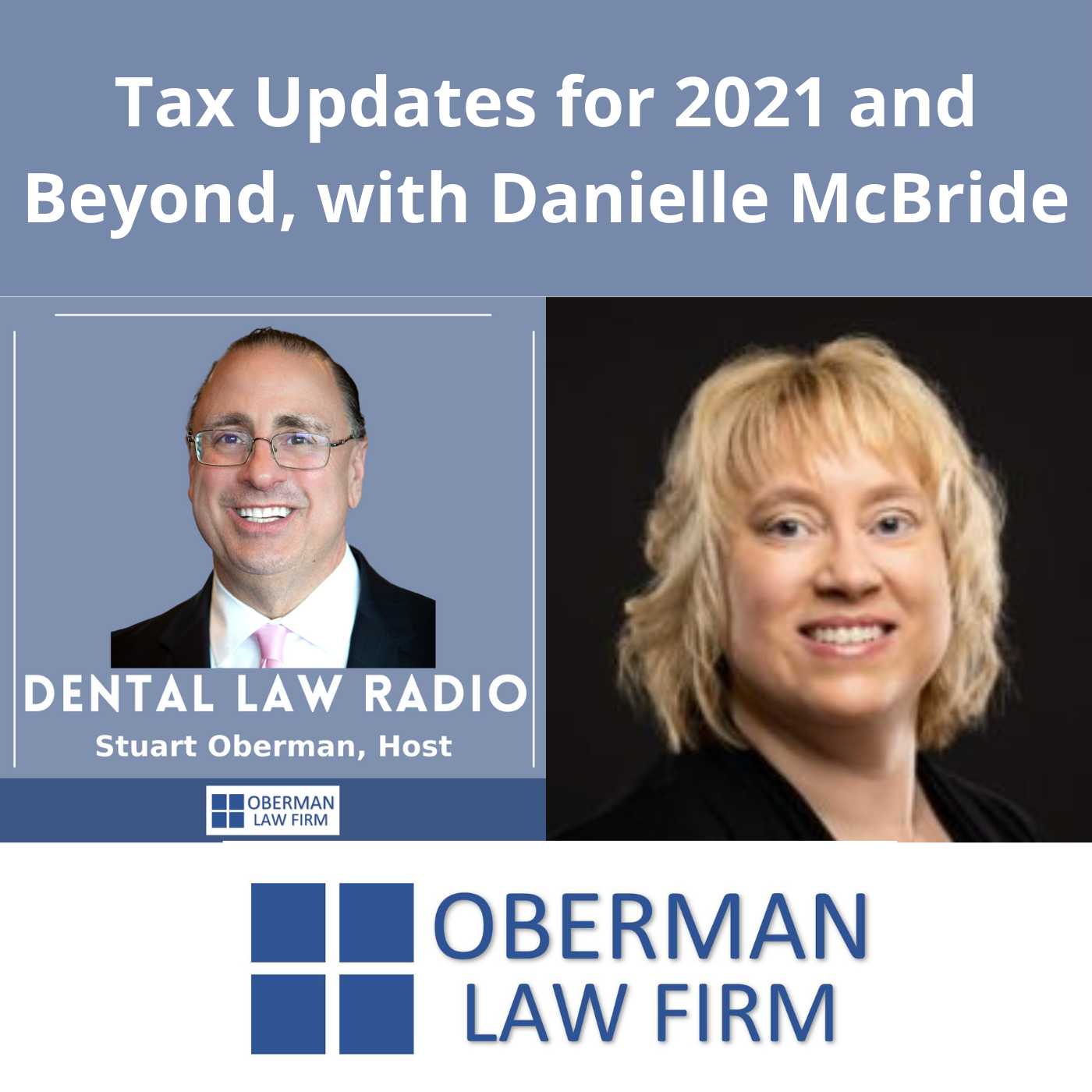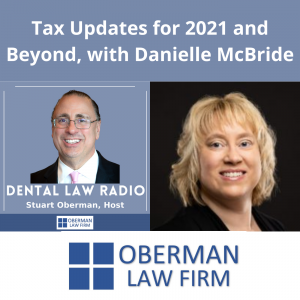
 Tax Updates for 2021 and Beyond with Danielle McBride, Oberman Law Firm (Dental Law Radio, Episode 28)
Tax Updates for 2021 and Beyond with Danielle McBride, Oberman Law Firm (Dental Law Radio, Episode 28)
On this edition of Dental Law Radio, Stuart Oberman was joined by Danielle McBride, tax authority and Partner at Oberman Law Firm, to discuss tax updates for 2021 and beyond. Danielle discussed changes in the Employee Retention Tax Credit, potential tax increases, a surtax on net investment income, and much more. Dental Law Radio is underwritten and presented by Oberman Law Firm and produced by the North Fulton studio of Business RadioX®.
Danielle McBride, Partner, Oberman Law Firm

Danielle McBride has been practicing law for over 21 years, and her primary focus is representing healthcare clients on a local, regional, and national basis. Ms. McBride regularly consults with clients regarding simple to complex healthcare transitions, including mergers and acquisitions, employment law, governmental compliance, tax strategies, practice valuations, DSO formation and structures, employee compensation, associate and partnership contracts, joint ventures, and partnership buy-in/buy-outs.
In addition, Ms. McBride brings a wealth of knowledge and experience preparing practice valuations for clients, as well as formulating simple to complex tax strategies, and entity formations.
Ms. McBride holds a Bachelor of Arts in Sociology/Criminology from The Ohio State University, a Juris Doctor (J.D.) from Ohio Northern University Pettit College of Law, and a Master of Laws (LL.M.) in Taxation from Case Western Reserve University.
TRANSCRIPT
Intro: [00:00:02] Broadcasting from the Business RadioX Studios in Atlanta, it’s time for Dental Law Radio. Dental Law Radio is brought to you by Oberman Law Firm, a leading dental-centric law firm serving dental clients on a local, regional and national basis. Now, here’s your host, Stuart Oberman.
Stuart Oberman: [00:00:26] Welcome, ladies and gentlemen, to Dental Law Radio. I have the absolute honor of having, Danielle McBride, Partner Oberman Law Firm, joining us today. And we’ve got a great, great topic. But first I want to get to talk to Danielle a little bit about really what she does at our law firm, which is amazing, and that’s why that I want to really have her on today’s podcast.
Stuart Oberman: [00:00:54] So, Danielle’s been practicing for about 21 years and focuses on health care and on the regional national basis. And Danielle handles a lot of dental transitions, healthcare transitions, employment law and tax. So, that’s going to be one of our topics today and, also, practice valuations. And Danielle has her Law Degree from Ohio Northern University and a Master’s in Tax from Case Western Reserve University. And there is no better topic today in today’s world if you’re a dental practice owner than tax.
Stuart Oberman: [00:01:36] So, Danielle, I want you to talk a little bit today about tax update for 2021 and beyond. I know that you are in tune immensely as to what’s going on with that. You have an enormous amount of resources. And we are extraordinarily happy to have you as a member of the firm. And I know we rely on you a lot for a lot of complex stuff. So, it is my absolute pleasure to have you on today. So, tax, tax, tax, tax, tell us what’s going on. And welcome, welcome, welcome.
Danielle McBride: [00:02:08] Tax. Well, thanks Stuart for the introduction. And I’m really happy to be here today and talk about tax, which to most people sounds like a boring topic, but it really plays a huge role in all of these transitions that we do. And part of what we do as a dental-specific lawyer is to make sure that we keep up to date on things that affect our clients in particular. And these tax laws, there’s a lot of stuff that does not affect clients in our business, but the things that do are important for them to learn.
Danielle McBride: [00:02:43] And we’ve got two real big bills, two bills that have gone through the the House, one passed into law. We’ve got the Infrastructure Investment and Jobs Act, which was actually passed and signed into law by the President November 15th. That had some major items. It’s the largest infrastructure act in decades. It’s got major items for disaster relief, capital contributions, public utilities, excise taxes, cryptocurrency provisions. And there’s one item in particular that has an impact on our dental clients. And that’s this Employee Retention Tax Credit, which was originally put into place under the CARES Act to allow those practices that had a decrease in revenues be able to claim some tax credits.
Danielle McBride: [00:03:33] So, the Infrastructure Investment Jobs Act actually ended that retroactively to September 30th of 2021. When it was originally put in place, it was supposed to — and it was extended through the end of 2021. So, now, we’ve lost the fourth quarter. That also keys up a few problems because they did this so late that there were some employers who had already withheld deposits thinking that they were going to get this credit. And so, there’s actually a new notice that came out on that. So, this earned income employee retention tax credit is 70% of qualified wages paid in a calendar quarter before, now, September 30th of 2021. The only exception to September 30, 2021 is the recovery startup business. And that’s someone who probably wasn’t in business before the March 2020 COVID shutdown. So, those clients have the ability to maybe qualify for quarter four when they wouldn’t have before this Infrastructure Act was signed into law.
Stuart Oberman: [00:04:57] I got one question. What kind of notice was sent out? What kind of notice when you say notice?
Danielle McBride: [00:05:02] It’s an IRS notice. So, the IRS notice, it’s Notice 2021-65 issued by the IRS. And that’s to provide guidance on the rollback of the employee retention tax credit, except for those recovery startups, like I mentioned. And so, for those employers that got an advance on the credit, the IRS isn’t making you repay that money until the due date of the fourth quarter return, which is January 31st of 2022. They’re also including a waiver-
Stuart Oberman: [00:05:32] Can our doctors get a copy of that from us? Because I know we get these questions from from CPAs.
Danielle McBride: [00:05:38] Yeah, we have access to it. We can give it. If there are dental CPAs or clients who want a copy of this notice, we have access to tax research. We can easily provide a copy of that notice. Notice also allows for some waiver of failure deposit penalties if you retain those deposits before December 20th of 2021. So, important piece of information for all those dental advisors to have in counseling their clients for this last quarter of the year.
Stuart Oberman: [00:06:14] Well, I know when you say — so, how do our clients or anyone who’s listening today get that information? They just email to you, and you can just send out-
Danielle McBride: [00:06:27] Sure, they can email our office.
Stuart Oberman: [00:06:30] Okay.
Danielle McBride: [00:06:30] They can email me at our office. It’s just Danielle@ObermanLaw.com. Or they can call and ask for me at our office phone number, 770-886-2400.
Stuart Oberman: [00:06:43] Now, there’s a lot of acronyms thrown around through all this legislature stuff that’s going on now and probably into 2022. So, when our doctors hear the acronym ERC, what does that stand for?
Danielle McBride: [00:06:58] Employee retention credit. And sometimes, also-
Stuart Oberman: [00:07:00] And that’s what you’re talking about.
Danielle McBride: [00:07:01] And sometimes, also, referred to as ERTC, employee retention tax credit.
Stuart Oberman: [00:07:06] Got it. Okay. Now, one thing is we get questions on how does the Back Better Act affect my practice? And I know you are on the forefront of that.
Danielle McBride: [00:07:20] Sure. And the Employee Retention Tax Credit was part of the Infrastructure Act. The second piece of legislation is the Build Back Better Act, and that has not been signed into law yet. It has passed the House and there is a Senate version. And that Senate version was passed or the act was passed by the House on November 19th. It’s been with the Senate. The CBO or the Congressional Budget Office has given some statistics to the senators on how much this is going to cost, what’s going into the bill, how are we paying for these things, tax increases and spending, all of that.
Danielle McBride: [00:08:02] And December 11th, a draft legislative text was released by the Senate Finance Committee chair. And so, that’s the current version of the bill that the Senate is looking at. It’s going to take all 50 senators for this thing to pass, and they’re still negotiating it. And there are senators like Senator Manchin who-
Stuart Oberman: [00:08:23] Of course.
Danielle McBride: [00:08:23] … are really pushing on this tax legislation. They have a couple of concerns; one with the Congressional Budget Office dollar amounts on this thing. And then, the other big issue that’s being debated under this Build Back Better Act is the SALT or the state and local tax deduction cap. It was a $10,000 cap. They want to raise it to $80,000. Cap was supposed to sunset in 2025, and they’re talking about pushing it out a little longer or maybe taking away that cap after 2025 or 2032, I think has been mentioned on this. So, that’s the biggest concern.
Danielle McBride: [00:09:12] For those of our clients who are concerned about this, the good news is this act had a lot of tax provisions in it that could have raised things like capital gains rates, individual and corporate business tax rates, estate planning issues and IRA contribution amounts. Things like that were contained in that bill. All the individual rates and the capital gains rate increases were removed from the bill. And some other limitations to that would have been a concern, most of those are no longer in the text of the bill, and it doesn’t look like those kind of things are going to get negotiated back in.
Danielle McBride: [00:09:54] So, those key provisions in this Build Back Better Act are going to be things like extended child tax credits, earned income tax credits, added childcare entitlements and paid family leave. There are some climate change spending in there. Tax increases, the state and local tax issue that I mentioned, there’s also tax increases for large corporations – a 15% tax on large corporations, one percent excise tax on stock buybacks for corporations. These are all things that are probably not going to affect our smaller dental practices. Even the larger dental practices are probably going to fall underneath the limits to where this is going to have an effect on them. There are surtaxes on modified adjusted gross income, but it’s on income from $10 million to $25 million, and 8% above $25 million.
Danielle McBride: [00:11:07] The one thing that does potentially have an impact is an expansion on the 3.8% surtax on net investment income. They want to include trade and business income, which would also include our Sub-S corporations, and a lot of our dental practices are Subchapter S corporations, and they take that income out of the business. Those distributions are not subject to a 3.8% Medicare payroll tax. If this expansion on the surtax on net investment income is expanded, then that’s going to take away what some people call the S-Corporation loophole. So, those are-.
Stuart Oberman: [00:11:49] Are major-
Danielle McBride: [00:11:49] There’s some other minimum distribution rules. Backdoor Roth IRA contributions and things like that are also being discussed. Roth IRA conversions, backdoor Roth IRA conversions may end in 2022. That’s one of the things that’s under this bill, which may have a big impact on some of our clients as well. Those are where there are certain income limits that don’t allow you to use a Roth IRA feature. And so, to take that away would mean you can’t get a Roth IRA. And those are the big issues in that act.
Stuart Oberman: [00:12:35] Wow. Well, I know that you are a major contributor to our Advisory Insights newsletter. And I know you’ll be bringing our listeners up to date on a regular basis regarding that. And I know-
Danielle McBride: [00:12:49] Right.
Stuart Oberman: [00:12:49] And we’re going to talk a little bit in a subsequent podcast regarding capital gains and ordinary income. I know you’re expert on that also. So, wow, there’s a lot of stuff. So, I think this is a great update. Again, we could talk for days on this topic, but I think this — I mean, it’s unbelievable. And I know some of this stuff that you’re reviewing, and looking at, and writing about, so this is major stuff.
Stuart Oberman: [00:13:20] Well, I think this gives our listeners a really, really good, good basis moving forward into the new year, especially what they need to do for this year. Although we got a week and a half, and I know there’s going to be lot of — or about week and half or so — a lot of scurrying activity. And this will keep our guys pretty busy with the CPAs. So, no, this is great stuff. Again, there’s so many moving pieces to this. And I know that you just scratched the surface of the highlights. I will tell you that.
Stuart Oberman: [00:13:54] So, well, I’ll tell you, well, it’s amazing. So, we’re going to bring you back on some subsequent podcasts. I know we got a couple more to go and our listeners are going to be even more informed. So, amazing. Danielle, thank you so much for joining us today. I know you’re very busy with yearend stuff and all the tax reviews coming up in the Legislature stuff. So, ladies and gentlemen, thank you for joining us.
Danielle McBride: [00:14:24] Thanks, Stuart, for having me.
Stuart Oberman: [00:14:25] And then, what we’ll do is if you have any questions, concerns, feel free to reach out to us. Number is 770-886-2400. Oberman Law Firm, if you have any questions, please feel free to email myself Stuart@ObermanLaw.com or Danielle@ObermanLaw.com. Folks, thanks for joining us, and have a fantastic day. Talk to you soon.
About Dental Law Radio
Hosted by Stuart Oberman, a nationally recognized authority in dental law, Dental Law Radio covers legal, business, and other operating issues and topics of vital concern to dentists and dental practice owners. The show is produced by the North Fulton studio of Business RadioX® and can be found on all the major podcast apps. The complete show archive is here.
Stuart Oberman, Oberman Law Firm

Stuart Oberman is the founder and President of Oberman Law Firm. Mr. Oberman graduated from Urbana University and received his law degree from John Marshall Law School. Mr. Oberman has been practicing law for over 25 years, and before going into private practice, Mr. Oberman was in-house counsel for a Fortune 500 Company. Mr. Oberman is widely regarded as the go-to attorney in the area of Dental Law, which includes DSO formation, corporate business structures, mergers and acquisitions, regulatory compliance, advertising regulations, HIPAA, Compliance, and employment law regulations that affect dental practices.
In addition, Mr. Oberman’s expertise in the health care industry includes advising clients in the complex regulatory landscape as it relates to telehealth and telemedicine, including compliance of corporate structures, third-party reimbursement, contract negotiations, technology, health care fraud and abuse law (Anti-Kickback Statute and the State Law), professional liability risk management, federal and state regulations.
As the long-term care industry evolves, Mr. Oberman has the knowledge and experience to guide clients in the long-term care sector with respect to corporate and regulatory matters, assisted living facilities, continuing care retirement communities (CCRCs). In addition, Mr. Oberman’s practice also focuses on health care facility acquisitions and other changes of ownership, as well as related licensure and Medicare/Medicaid certification matters, CCRC registrations, long-term care/skilled nursing facility management, operating agreements, assisted living licensure matters, and health care joint ventures.
In addition to his expertise in the health care industry, Mr. Oberman has a nationwide practice that focuses on all facets of contractual disputes, including corporate governance, fiduciary duty, trade secrets, unfair competition, covenants not to compete, trademark and copyright infringement, fraud, and deceptive trade practices, and other business-related matters. Mr. Oberman also represents clients throughout the United States in a wide range of practice areas, including mergers & acquisitions, partnership agreements, commercial real estate, entity formation, employment law, commercial leasing, intellectual property, and HIPAA/OSHA compliance.
Mr. Oberman is a national lecturer and has published articles in the U.S. and Canada.
Oberman Law Firm
Oberman Law Firm has a long history of civic service, noted national, regional, and local clients, and stands among the Southeast’s eminent and fast-growing full-service law firms. Oberman Law Firm’s areas of practice include Business Planning, Commercial & Technology Transactions, Corporate, Employment & Labor, Estate Planning, Health Care, Intellectual Property, Litigation, Privacy & Data Security, and Real Estate.
By meeting their client’s goals and becoming a trusted partner and advocate for our clients, their attorneys are recognized as legal go-getters who provide value-added service. Their attorneys understand that in a rapidly changing legal market, clients have new expectations, constantly evolving choices, and operate in an environment of heightened reputational and commercial risk.
Oberman Law Firm’s strength is its ability to solve complex legal problems by collaborating across borders and practice areas.
Connect with Oberman Law Firm:
Company website | LinkedIn | Twitter

 Tax Updates for 2021 and Beyond with Danielle McBride, Oberman Law Firm (Dental Law Radio, Episode 28)
Tax Updates for 2021 and Beyond with Danielle McBride, Oberman Law Firm (Dental Law Radio, Episode 28)













